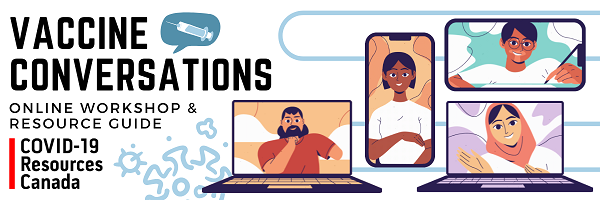By Dr. Tara Moriarty
The COVID-19 epidemic is not over in Canada, and a substantial portion of the population remains unvaccinated. This includes about 10 per cent of people 40 and older, who are most likely to end up in hospital and/or admitted to intensive care units if they contract COVID-19. Misinformation and politicization has had profound effects on vaccine uptake around the world. Vaccination has slowed to a near-stall in older age groups in many provinces, especially in the rural areas of Ontario, Saskatchewan, Alberta and British Columbia. In some parts of the country, vaccine uptake remains as low as 30-40%, and we know that if rates don’t speed up, an estimated 32,000 COVID-19 deaths or more may still occur in Canada among unvaccinated people. It is a life and death race to help unvaccinated people understand the risks they face, and the risk they pose to their communities’ healthcare systems.
Research from the United States shows that friends and family have twice as much influence as healthcare providers and experts when it comes to personal vaccination decisions, and it is likely the same in Canada as well. Almost all of us know and love people who aren’t yet vaccinated, and we worry about them a lot. Many of us have had very difficult conversations about this topic with our loved ones, and can attest to how much this is a source of significant stress for all involved. It is common for people to publicly express frustration and anger with those who aren’t yet vaccinated, without realizing that there are a wide range of reasons why people remain hesitant. We know from harm reduction research that when people feel blamed or shamed it only reinforces harmful behaviours and isolates people, thus damaging trust in relationships and making it harder for people to change. It’s especially important for people who don’t trust vaccines to know that they are still cared about, and that their friends and family will support them if they’re thinking of changing their minds.
So how do we have effective conversations about vaccines with people who fear or are suspicious of them? First, it’s important to know that some people will never change their minds, and there’s no point in arguing. What matters most is that we make sure the person knows you care about them, and that the door is always open if they want to talk. However, it’s also worth remembering that you can set personal boundaries about higher risk activities such as sharing indoor space.
For those who aren’t committed to their decision but rather are frightened of the vaccines and need substantial support to be able to make comfortable health decisions, it’s crucial to listen to their points of view about vaccines, and ask them if they want to discuss the information they share. The decision is ultimately theirs to make. Once engaged, the conversation must focus on retaining or rebuilding trust and avoiding conflict and judgement.
These conversations are very challenging for most people, even more so for people who are deeply worried about loved ones or frustrated with how long the pandemic is dragging on. They can also be tough for people who don’t have the science background or technical understanding of vaccines to respond to common questions with confidence. That being said, family and friends are so important for vaccination decisions, and the need to get people vaccinated is so urgent that it’s crucial for healthcare providers, scientists and experts to provide support for everyone who is trying.
On November 17, COVID-19 Resources Canada launched a free workshop program to help Canadians learn how to have vaccine conversations. The program is accompanied by access to ongoing, unlimited drop-in support so that people having these conversations with others can check in with healthcare providers and scientists about tough questions. They can also meet other people who are having these conversations, and share useful tips for how to handle some questions and scenarios. Finally, the workshop provides a library of multimedia resources with answers to common COVID-19 vaccine questions.
COVID-19 Resources and its team of volunteer scientists, physicians, pharmacists and nurses has been running a COVID-19 Vaccine Q&A program on Zoom since January 4, 2021. We’ve provided nearly 300 hours of Q&A programming and spoken with nearly 17,000 people living in Canada, in a wide range of languages. If you’d like to join a Q&A session or sign up for the workshop program, please visit https://covid19resources.ca/public/vaccine-conversations/ .
We are here to share our skills and knowledge, and ensure that everyone living in Canada can speak directly with a vaccine expert. Together, we can help save lives and protect those we love.
Dr. Tara Moriarty is an infectious diseases researcher at the University of Toronto and co-founder of COVID-19 Resources Canada.


